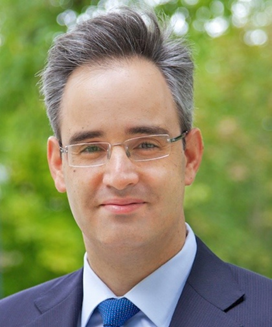AP-S Distinguished Lecture: From Propagation Models to Physics-Based Digital Twins of Emerging Wireless Communications Systems (IEEE Atlanta AP/MTT Lunch & Learn Event)
Atlanta's IEEE AP/MTT joint-chapter is hosting an AP-S distinguished lecture and lunch and learn event on July 9th (Wed.) from 11:30AM-1PM EST at the GTRI Conference Center on 14th Street. We invited Dr. Costas Sarris of the University of Toronto to give a talk titled: "From Propagation Models to Physics-Based Digital Twins of Emerging Wireless Communication Systems." Talk abstract and speaker bio can be read below. Pizza will be served to attendees. Anyone interested is welcome to attend! There is a virtual attendance option, but we highly recommend attending in-person since Dr. Sarris will be presenting in-person and we want this event to be interactive.
This lecture is sponsored by IEEE AP Society Distinguished Lecturer Program.
--------------------------------------------------------------------------------------------------------------------------------------------
Please let us know any dietary restrictions you may have in your registration. For guest parking passes, email csaetia3@gatech.edu
-------------------------------------------------------------------------------------------------------------------------------------------
What is IEEE AP/MTT?
In Atlanta, the local chapters for the IEEE Antennas and Propagation Society (AP-S) and Microwave Theory and Technique Society (MTT-S) are merged to form the joint AP/MTT chapter. We are composed of members at various stages of their careers, who work and do research in various electromagnetics disciplines, like antenna design, microwave circuits, RF systems analysis, etc. We welcome any students, young professionals, researchers, and senior engineers in Atlanta to join our joint-chapter and participate in our technical and service activities.
Date and Time
Location
Hosts
Registration
-
 Add Event to Calendar
Add Event to Calendar
Loading virtual attendance info...
- 250 14th St NW
- Atlanta, Georgia
- United States 30318
- Building: GTRI Conference Center
- Room Number: Meeting Room 119A
- Click here for Map
Speakers
Costas
From Propagation Models to Physics-Based Digital Twins of Emerging Wireless Communication Systems
The continuous proliferation of wireless technologies, from 5G communications to the Internet of Things, creates a compelling need to intelligently plan the deployment of such systems in indoor and outdoor environments. This planning is required to meet the desired Quality of Service objectives (e.g. high bit-rates for Wi-Fi networks) along with safety standards for exposure of users to radiated emissions, and to ensure compatibility with existing systems. Wireless propagation modeling, which is the prediction of the electromagnetic field levels generated by a wireless communication system, is an essential element of such an intelligent planning process. These models can be deduced by numerical algorithms based on the physics of electromagnetic wave propagation, or by measurements.
Software-based planning is a reality in several areas, including the design of environmentally friendly buildings, where simulation tools are used to optimize heat and air flow. The question is how to enable a similar approach for wireless infrastructure that is becoming as indispensable as any other infrastructure element.
This presentation is aimed at demonstrating that machine learning enabled propagation models can address this question, overcoming the dichotomy between accuracy and efficiency that has dominated this area for decades. We give an overview of the most recent advances in the field, including neural networks that can accurately predict, in real-time, signal strength levels of indoor and outdoor wireless networks by processing the geometry and the position of one or more transmitters. We discuss the use of such models for the rapid placement of massive numbers of access points of wireless networks, such as those providing wireless connectivity to spectators in large sports venues. Finally, we show that this research leads to reliable “digital twins” of wireless communication systems. These are robust computational models that allow for the full evaluation of the performance of wireless networks, under changes in the environment and the conditions of operation over time.
Biography:
Costas Sarris is a Professor with the Department of Electrical and Computer Engineering, University of Toronto. His research area is computational electromagnetics, with an emphasis on time-domain modeling. He also works on physics-based wireless propagation models (with full-wave, asymptotic, and hybrid techniques), uncertainty quantification, and scientific machine learning.
Dr. Sarris is an IEEE Fellow and a Distinguished Lecturer of the IEEE Antennas and Propagation Society for 2024-2026. He was a recipient of the 2021 Premium Award for Best Paper in IET Microwaves, Antennas & Propagation, and the IEEE MTT-S Outstanding Young Engineer Award in 2013. He was the TPC Chair of the 2015 IEEE AP-S International Symposium on Antennas and Propagation and the CNC/USNC Joint Meeting, the 2019 and 2023 MTT-S Numerical Electromagnetics, Multiphysics and Optimization (NEMO) Conference, the TPC Vice-Chair of the 2012 IEEE MTT-S International Microwave Symposium, and the Chair of the MTT-S Technical Committee on Field Theory and Numerical Electromagnetics (2018–2020). In 2019-2024, he was the Editor-in-Chief of the IEEE JOURNAL ON MULTISCALE AND MULTIPHYSICS COMPUTATIONAL TECHNIQUES.
Agenda
11:30-11:40 AM - Updates on IEEE Atlanta AP/MTT joint-chapter's activities
11:40-12:40 PM - DL with Dr. Costas Sarris presenting: From Propagation Models to Physics-Based Digital Twins of Emerging Wireless Communication Systems
12:40-1:00PM - Q/A, interaction with attendees, and wrap-up.


